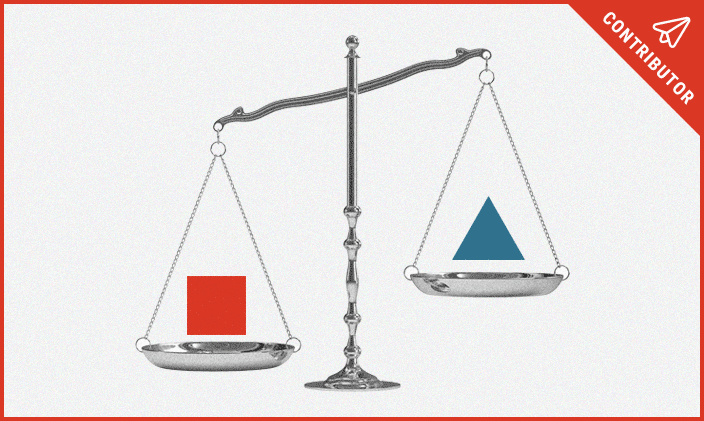
- Majors & Careers
- Online Grad School
- Preparing For Grad School
- Student Life

PhD Candidate vs Student: What’s the Difference?

Many people use the terms “PhD student” and “PhD candidate” interchangeably. However, these terms actually mean something quite different, including a different status level at universities.
We’re here to define the differences between a PhD candidate vs student, as well as other essential information, before you continue your educational journey.
Table of Contents
What I s a PhD student?
A doctoral student is anyone who is enrolled in a doctorate degree, also referred to as a Doctor of Philosophy (PhD) program. PhD students are typically required to complete a certain number of course credits and sit qualifying exams. Next, they can move on to conduct research and present it in the form of a dissertation.
A PhD is centered around self-directed research and possibly teaching/running tutorials, but they typically also involve a substantial amount of coursework and require attending classes, either online or in person.
Unlike candidates, PhD students are in the process of completing the required coursework for the degree. They haven’t passed the relevant qualifying exams yet.
What Is a PhD Candidate?
A PhD candidate has completed the required coursework and passed the qualifying exams for their doctorate program. They are currently working on their dissertation.
Most PhD students need to go through an application process and show they meet certain requirements such as a relevant master’s degree . To become a PhD candidate, doctoral students need to pass an internal application process, typically involving a set of exams.
This stage involves significant research usually in innovative areas and incorporating this into a dissertation (this stage is sometimes referred to as “all but dissertation” [ABD]), as they’ve completed all other aspects of the program and satisfied these requirements. To complete their doctoral journey, a PhD candidate must defend their dissertation. Once they’ve successfully done this, they will be awarded their degree and move from PhD candidate to doctor of their chosen field.
PhD Candidate vs Student: 6 Key Differences

There are a number of key differences between a PhD student vs PhD candidate, from their status to the structure and nature of study.
Note: Some universities have recently started adopting hybrid approaches (where there is no clear difference between PhD students and PhD candidates). These programs don’t involve any qualifying exams and students typically begin the dissertation as part of their coursework. Most schools, however, continue with the traditional distinction between a PhD candidate and PhD student.
1. Program Stage
A PhD student could be at any stage of the doctoral program . Coursework still needs to be completed and qualifying exams must be passed. Students may be in the initial stage of the program or about to complete the coursework (before beginning their research).
On the other hand, a PhD candidate has completed all coursework and has at least started their research. They may have completed their dissertation and are preparing to defend it.
2. Research Progress
A PhD student may not have selected their research topic or settled on a particular research question. A candidate’s research is in progress and they should already have a clear research question.
3. Relationship with Advisors
A PhD student may not yet have an advisor. A candidate has an established working relationship with their advisor and works closely with them to complete their research and dissertation.
4. Level of Support
Although they work closely with an advisor, a PhD candidate is generally expected to work more independently than a student enrolled in a doctoral student. Once candidates reach this stage of their doctorate, they typically won’t receive as much direction or supervision.
5. Flexibility and Structure
Understandably, PhD candidates have more freedom and flexibility in their work. Most candidates choose their area of research, as well as the methods used to conduct their work. As part of their coursework, PhD students usually have to work within a set structure (e.g., completing core subjects, meeting deadlines).
Being a PhD candidate comes with a certain degree of status. If they’ve demonstrated a degree of expertise through completing qualifying exams, candidates can put the letters PhD(c) after their name.
Tips for PhD Candidates

A PhD is an advanced degree designed to demonstrate expertise in a given field, as well as high-level skills and abilities in various areas (including research and writing). As such, earning a doctorate can be a challenging process.
The following tips for doctoral candidates will help you put your best foot forward and set yourself up for success.
Stay Organized
Because PhD candidates have to balance many competing priorities, organization is essential. Using organizational tools such as calendars, note-taking apps , and project management software can help you keep track of deadlines and meet your targets.
Focus on Your Research
PhD candidates likely have busy schedules with plenty of demands (such as teaching commitments and crafting a dissertation). As it’s the backbone of any doctoral program, be sure to prioritize this part of your work and monitor progress to stay on track.
Actively Seek Out Feedback
Because PhD candidates often work independently, there’s a risk of feeling isolated. Ask your advisors, mentors, and fellow candidates for feedback and advice. This will help ensure that you’re considering all aspects of your research question and multiple solutions, rather than focusing too intensely on a single area.
Take Advantage of Networking Opportunities
Networking is one of the biggest benefits for PhD candidates, so take full advantage of these events. Use this time to build a strong network of professors, advisors, fellow candidates, and other professionals you meet at conferences and events.
Take Care of Yourself
A PhD program can be taxing, and it’s easy for your mental and physical health to take a backseat. Make sure you exercise, eat well, and get enough sleep . Remember: Resting and recharging is crucial for working on your dissertation.
How Long Is a Typical PhD Candidacy?

Most PhD students require 1-2 years to complete their coursework and pass their qualifying exams. However, the length of a PhD candidacy is much more open. In most cases, programs take between two and five years, depending on:
- the complexity of the field of research
- the candidate’s other commitments, such as teaching load
- other abilities, such as a candidate’s level of organization.
Once a PhD candidate has completed their dissertation, they have to defend it successfully before a panel of faculty members before they can earn their doctorate degree. This process of defending a PhD dissertation can take several months.
Some universities specify a maximum length for PhD candidacy duration. For example, Carnegie Mellon University limits this to six years .
Benefits of Being a PhD Candidate
Being a PhD candidate can be rewarding for several reasons:
1. Research Opportunities
You’ll be exposed to vast research opportunities in your field. You may contribute to valuable discoveries while developing advanced knowledge and skills.
2. Networking
Through your PhD candidacy, you’ll also be in a great position to build gain a stronger network of fellow professionals.
3. Critical Thinking
A PhD candidacy can help you develop high intellectual independence and critical thinking skills.
4. Career Opportunitie s
A PhD is an advanced degree that allows you to build a rewarding career in the academic, government, and private sectors. PhD-holders can also expect to earn more than other graduates and are most likely to find a job.
5. Salaries
According to Northeastern University , professionals with a doctorate degree earn an average annual salary of $99,290 on average (and much more for the highest-paid PhDs ) and have a 1.5% unemployment rate. For master’s degree holders, the average annual salary is $81,867 average annual salary and a 2.6% unemployment rate.
6. Personal Fulfillment
Being a PhD candidate can help you pursue your passions. This advanced qualification will allow you to become a specialist in your chosen field, allowing you to hone in on the exact subject thatl fulfills you the most.
Qualifying Exams to Become a PhD Candidate

While requirements vary by program, to become a PhD candidate, most students will need to pass a set of exams. These will test students’ knowledge in the field, measure their research skills, and ensure they’re ready to start their dissertation research.
Traditionally, qualifying exams for PhD candidates involved a written test and an oral exam. These will cover a range of topics related to your field of study, with the oral component designed to demonstrate your level of understanding.
Some universities have recently started to issue doctoral students with a set of questions and have them submit the answers within a set timeframe (usually around two weeks). Other schools ask prospective doctoral candidates to submit a dissertation proposal instead of an exam.
Frequently Asked Questions
Can a phd candidate be called a doctor.
In most cases, a doctoral candidate cannot be called a doctor until after they successfully defend their dissertation and receive their doctorate.
Can I Put ‘PhD Candidate’ after My Name?
Once you’ve passed qualifying exams and embarked on dissertation research, you’re technically entitled to put “PhD candidate” or “PhD (c)” after your name. However, this is uncommon and not always recommended. It is generally more acceptable to mention that you are pursuing a doctorate (along with the field of research and university) or that you expect to complete your PhD in a certain year (on your CV and online profiles).
How Long Can You Be a PhD Candidate?
There isn’t a set length of time that a person can be a PhD candidate. The length of candidacy depends on a range of factors, including the subject of research and program requirements. Most PhD candidates complete this phase in around 3-5 years (where some university programs have set limits).
Do PhD Students Take Classes?
Yes, most PhD students must take classes and complete coursework as part of the first 1-2 years of their doctorate program. Once they’ve completed this coursework and passed qualifying exams, they move on to work on their research dissertation. At this stage, they’ll be considered a PhD candidate.
Key Takeaways
Now that you know the differences between PhD candidates vs. students, you’ve got a deeper understanding of how to obtain a doctorate. However you slice it, both will help you build your knowledge and skills to become an expert in your field.
However the program is structured, a PhD is a highly valuable degree that allows you to become a high-level professional and build a successful career.
If you know a PhD candidate who’s celebrating their accomplishments soon? Take a look at this guide to the best PhD graduation gifts .
- 10 Best PhD Programs in Pennsylvania
- Top 10 Best PhD in Cybersecurity Online Programs
- 10 Top PhD Programs in Chemistry
- The Top 10 Easiest PhDs: Tuition, Duration, and Financial Aid
- Top 10 Fully Funded PhD Programs and Universities
- Top 10 Best PhD in Medicine Programs

Lisa Marlin
Lisa is a full-time writer specializing in career advice, further education, and personal development. She works from all over the world, and when not writing you'll find her hiking, practicing yoga, or enjoying a glass of Malbec.
- Lisa Marlin https://blog.thegradcafe.com/author/lisa-marlin/ 30+ Best Dorm Room Essentials for Guys in 2024
- Lisa Marlin https://blog.thegradcafe.com/author/lisa-marlin/ 12 Best Laptops for Computer Science Students
- Lisa Marlin https://blog.thegradcafe.com/author/lisa-marlin/ ACBSP Vs AACSB: Which Business Program Accreditations is Better?
- Lisa Marlin https://blog.thegradcafe.com/author/lisa-marlin/ BA vs BS: What You Need to Know [2024 Guide]

14 Cheap Spring Break Destinations for College Students in 2024
How to get a master’s without a bachelor’s: the complete guide, related posts.

- How Many Grad Schools Should I Apply To?
![phd student or graduate student When to Apply for Grad School: The Simple Guide [2026/2027]](https://blog.thegradcafe.com/wp-content/uploads/2021/08/When-to-Apply-to-Grad-School-350x250.png)
- When to Apply for Grad School: Easy Monthly Timeline [2025-2026]

- 30+ Best Dorm Room Essentials for Guys in 2024

- Best Laptop for Programming Students in 2024

The Sassy Digital Assistant Revolutionizing Student Budgeting

Computer Science Graduate Admission Trends: Annual Results

Leave a Reply Cancel reply
Your email address will not be published. Required fields are marked *
Save my name, email, and website in this browser for the next time I comment.
Recent Posts
- Last Mile Education Fund Paves the Way for Tech Students, Offers Lifeline Grants

© 2024 TheGradCafe.com All rights reserved
- Partner With Us
- Results Search
- Submit Your Results
- Write For Us

PhD Student vs Graduate Student [Correct terminologies]
As you progress down the academic pathway it can become confusing to work out what the appropriate terminology is for your current level of education. Is it PhD student? Is it graduate student? Is the PhD student the same as a graduate? Well, this article will answer all your questions.
Graduate student is an umbrella term for someone with an undergraduate qualification (bachelors, diploma), they are often performing graduate research in a Masters or PhD program. All PhD students are graduate students but not all graduate students are PhD students.
To fully get our heads around each of these definitions, we need to understand exactly what each term really means.
This is where we can look at the actual definitions of PhD student vs graduate student.

Definition of PhD student
A PhD student is someone who is currently enrolled in a doctorate degree program and is in the early stages of their course.
Some institutions require students to undergo a coursework component of their graduate program and are called a PhD student .
After the completion of the coursework component, with the research component still to go, they can be called a PhD candidate .
Definition of Graduate student
A graduate student is a known for a student who continues their studies after completion of their undergraduate degree.
The Cambridge dictionary defines it as:
A student who is studying for a degree that is higher than the one received after four years of study at a college or university.
Who is considered a graduate student?
Graduate students can include:
- Masters students
- PhD students
- Professional Masters
- Graduate academic certificate programs
- undergraduate/graduate hybrid degree programs
Even if you have got an undergraduate degree, there are many more options for you to obtain many more qualifications and build on your education. In these instances, you will be known as a graduate student.
Is a PhD student a graduate student?
Yes, a PhD student is a graduate student.
They have spent up to 4 years in their undergraduate programs in order to qualify for admission into a PhD program.
PhD students are able to call themselves graduate students but many choose to refer to themselves as PhD students or candidates.
Is PhD the same as graduate?
A PhD is the highest education attainable as a graduate.
In order to obtain a PhD one must graduate from an undergraduate degree. From the moment of graduating in their undergraduate degree they are known as a graduate.
The order of becoming a PhD from a graduate is shown in the table below. It also includes what happens after you get a PhD.
Is a doctoral student the same as a PhD student?
Strictly speaking, a PhD student is someone who is pursuing a doctor of philosophy.
A PhD student is a type of doctoral student but not all doctoral students are PhD students. Anyone aiming to achieve the title of ‘Dr’ is a doctoral student.
There are many other different types of doctoral students including:
- Doctor of Arts (DA)
- Doctor of Business Administration (DBA)
- Doctor of Design (DDes)
- Doctor of Engineering or Engineering Science (DEng, DESc, DES)
- Doctor of Education (EdD)
- Doctor of Fine Arts (DFA.)
- Doctor of Juridical Science (JSD, SJD)
- Doctor of Musical Arts (DMA)
- Doctor of Music Education (DME)
- Doctor of Modern Languages (DML)
- Doctor of Nursing Science (DNSc)
- Doctor of Philosophy (PhD)
- Doctor of Public Health (DPH)
- Doctor of Sacred Theology (STD)
- Doctor of Science (DSc, ScD)
- Doctor of Theology (ThD)
There are also professional degrees that lead to the person being called Doctor. These professional degrees result in honorific doctor titles, including those found in the table below.
In my 15 years in academia, I would only really refer to someone as a PhD student. However, if someone was to introduce themselves as a doctoral student I would understand them to be a PhD student.
Wrapping up
In this article, we have learned the difference between PhD student vs graduate student.
In summary, a graduate student is an umbrella term that includes anyone that has done an undergraduate qualification and is continuing their education. It includes Masters students, PhD students and others.
All PhD students are graduate students but not all graduate students are PhD students.

Dr Andrew Stapleton has a Masters and PhD in Chemistry from the UK and Australia. He has many years of research experience and has worked as a Postdoctoral Fellow and Associate at a number of Universities. Although having secured funding for his own research, he left academia to help others with his YouTube channel all about the inner workings of academia and how to make it work for you.
Thank you for visiting Academia Insider.
We are here to help you navigate Academia as painlessly as possible. We are supported by our readers and by visiting you are helping us earn a small amount through ads and affiliate revenue - Thank you!

2024 © Academia Insider


Research Voyage
Research Tips and Infromation
What is the Difference Between a PhD Candidate and a PhD Student?

Pursuing a doctoral degree is a significant academic achievement that requires years of dedicated study, research, and intellectual rigour. Within the realm of doctoral studies, the terms ‘PhD candidate’ and ‘PhD student’ are commonly used, often interchangeably. However, a closer examination reveals that there are nuanced differences between these two designations. Understanding these distinctions is crucial for both prospective doctoral students and those seeking to comprehend the various stages of the doctoral journey.
In this article, we delve into the disparity between a PhD candidate and a PhD student, shedding light on the roles, responsibilities, and progression associated with each stage. We explore the specific criteria that differentiate a student from a candidate and the various milestones marking the transition. Additionally, we delve into the responsibilities and expectations that accompany each designation, illuminating the unique experiences and commitments faced by PhD candidates and students.
Furthermore, we acknowledge the variability in terminology across international boundaries, academic institutions, and disciplinary fields, providing insights into how different contexts might influence the usage of these terms. By the end, readers will have a comprehensive understanding of the contrasting aspects between a PhD candidate and a PhD student, facilitating informed conversations and a deeper appreciation for the intricate nature of doctoral education.
Introduction
Who is a phd student, when phd student attains status of phd candidate, variation in terminology.
Pursuing a PhD (Doctor of Philosophy) degree involves conducting original research in a specific field of study, making a significant contribution to knowledge, and demonstrating a high level of expertise. It is the highest academic qualification one can attain and is highly valued in academia, research institutions, and certain industries. A PhD signifies a deep understanding of a subject area, advanced analytical and critical thinking skills, and the ability to conduct independent research.
While the terms “PhD candidate” and “PhD student” are often used interchangeably, there are subtle differences between the two.
A PhD student typically refers to an individual who has been admitted to a doctoral program, actively engaging in coursework and other program requirements. They are in the early stages of their doctoral journey and are working towards completing the necessary academic components of their degree. On the other hand, a PhD candidate is typically someone who has progressed beyond the coursework stage and has advanced to the research phase of their program. They have usually completed comprehensive exams, passed a research proposal defense, and are actively engaged in independent research for their dissertation or thesis.
The purpose of this article is to provide a comprehensive understanding of the distinction between a PhD candidate and a PhD student. By exploring the criteria, milestones, and responsibilities associated with each designation, this article aims to clarify the unique experiences and progression of doctoral students. It also seeks to address the varying terminology used across different contexts and disciplines, enabling readers to grasp the intricacies of the doctoral journey and fostering informed discussions around this topic.
Through this article, readers will gain a comprehensive understanding of the journey from being a PhD student to becoming a PhD candidate and the distinct roles and responsibilities associated with each stage.
A PhD student is an individual who has been admitted to a doctoral program and is actively engaged in pursuing their doctoral studies. They are at the initial stages of their doctoral journey, seeking to expand their knowledge, skills, and expertise in a specific field of study. PhD students play a vital role in academic research communities as they contribute to the generation of new knowledge and the advancement of their discipline.
PhD students are required to complete a set of coursework specific to their field of study. These courses are designed to provide a foundation in the discipline, enhance research skills, and broaden the student’s understanding of relevant theories and methodologies. Coursework may include seminars, advanced classes, and specialized topics. The specific coursework requirements can vary between programs and disciplines.
Example: Imagine a student named Alex who has just been accepted into a doctoral program in psychology. At this stage, Alex is considered a PhD student as they begin taking relevant coursework, attending seminars, and collaborating with faculty members. They are laying the foundation for their research and acquiring the necessary knowledge in their field.
Who is a PhD Candidate?
Advancement from being a PhD student to a PhD candidate typically involves meeting specific requirements set by the doctoral program. These requirements may vary depending on the institution and field of study but often include successful completion of coursework, exams, and other program-specific milestones.
One of the primary requirements for transitioning to a PhD candidate is the successful completion of coursework and exams. PhD students are expected to complete a designated set of courses, which provide a broad understanding of their field and research methodologies. They are also required to pass comprehensive exams, which assess their comprehensive knowledge and understanding of their research area.
As part of the transition to becoming a PhD candidate, students typically prepare and defend a research proposal. The research proposal outlines the scope, objectives, methodology, and significance of the intended research. The proposal defense may involve presenting the proposal to a committee of faculty members, who evaluate its feasibility, rigour, and contribution to the field. Additionally, PhD students often have to pass comprehensive exams, which test their knowledge of their research area and related disciplines.
If you are not familiar with writing PhD proposal and making PhD proposal presentation, then visit my articles on “ How to Write PhD Proposal Presentation to the University ” and ” How to Make a PhD Proposal Presentation to the University Panel” . These articles will guide you through the process of preparation and presentation of PhD proposal to the University panel.
Upon successful completion of the requirements, PhD students are often granted candidacy status. Advancement to candidacy signifies that the student has demonstrated the necessary knowledge, skills, and potential to conduct independent research and contribute to their field. This status allows students to focus more exclusively on their research and dissertation work.
Once students become PhD candidates, there is a shift towards an increased emphasis on independent research. They are expected to dedicate a significant portion of their time and effort to conducting original research, collecting data, analyzing results, and making novel contributions to their field. The focus is primarily on their dissertation or thesis work, which serves as the culmination of their doctoral studies.
Example: Let’s consider a PhD student named Alex in the field of computer science. After completing their coursework and passing comprehensive exams, Alex develops a research proposal outlining their intention to investigate the applications of machine learning in cybersecurity. They present the proposal to a committee of faculty members, who assess the feasibility and potential impact of the research.
Alex successfully defends their research proposal and is granted candidacy status, transitioning from a PhD student to a PhD candidate. With candidacy status, Alex’s focus shifts towards conducting independent research. They spend considerable time collecting and analyzing cybersecurity datasets, developing and refining machine learning algorithms, and testing their effectiveness in detecting and preventing cyber threats.
As a PhD candidate, Alex works closely with their advisor, regularly discussing research progress, seeking guidance, and receiving feedback. They collaborate with other researchers in the field, attend conferences to present their findings and contribute to the scholarly community through publications. The focus is now on producing an original and significant contribution to the field of computer science through their dissertation.
The transition to PhD candidacy marks a critical stage in the doctoral journey, as it signifies the ability to independently drive research and make scholarly contributions. PhD candidates like Alex are immersed in the world of research, expanding knowledge, and pushing the boundaries of their field.
Terminology related to PhD candidates and PhD students can vary internationally and among different academic institutions. In some countries, the terms “PhD candidate” and “PhD student” may be used interchangeably, while in others, there may be specific distinctions. For example, in the United States, “PhD student” is commonly used, while in the United Kingdom, “PhD candidate” is more frequently employed. Additionally, different universities or institutions may have their own terminology preferences, which can create further variation.
Terminology can also vary based on the disciplinary field of study. Different academic disciplines have their own conventions and terminology for referring to individuals pursuing a doctoral degree. For instance, in the sciences, one might encounter terms like “graduate researcher” or “doctoral candidate.” In the humanities and social sciences, the terms “PhD candidate” and “PhD student” are often used. This variation reflects the specific linguistic and cultural norms within different academic domains.
In Canada, for instance, doctoral students are commonly referred to as “PhD candidates,” regardless of their stage in the program. In Australia, “PhD candidate” is the preferred term for those who have completed the required coursework and have advanced to the research phase. In contrast, in the United States, “PhD student” is frequently used to refer to individuals at all stages of their doctoral studies.
Disciplinary variations can also be observed. In engineering, individuals pursuing a doctoral degree are often referred to as “PhD students” or “doctoral students.” In contrast, in the field of education, the term “PhD candidate” is commonly used to denote those who have advanced to the research and dissertation stage.
It is important to note that these examples represent general trends, and there can still be variation within specific institutions and programs. The usage of terminology can evolve over time and may be influenced by regional or institutional preferences.
The distinction between a PhD candidate and a PhD student holds significant importance in the realm of doctoral education.
While these terms are often used interchangeably, they represent different stages and responsibilities within the doctoral journey. A PhD student is in the initial stages of their program, actively engaging in coursework, research, and academic requirements.
On the other hand, a PhD candidate has advanced beyond coursework, passed comprehensive exams, and is focused primarily on independent research and the completion of their dissertation.
Upcoming Events
- Visit the Upcoming International Conferences at Exotic Travel Destinations with Travel Plan
- Visit for Research Internships Worldwide

Recent Posts
Copyright © 2024 Research Voyage
Design by ThemesDNA.com

- QUICK LINKS
- How to enroll
- Career services
The difference between doctoral students and doctoral candidates
This article was updated on January 2, 2024.

By Brian Fairbanks

In this article
Doctoral candidate vs. doctoral student, phd vs. practitioner doctorate.
- Explore online doctorate programs
Many people who earn a doctoral degree will, at some point, be both a doctoral student and doctoral candidate. While these roles may seem mysterious from outside the (real or virtual) halls of academia, the distinction is fairly simple.
Before we cover the distinction, however, let’s get on the same page about doctoral degrees.
What is a doctoral degree?
In academia, one degree sits at the very top: the doctoral degree. Also referred to as a doctorate, a doctoral degree is the most advanced educational credential you can earn. Though some fields of study (like journalism) don’t have a doctoral degree, most typical academic fields do, as do the fields of health, medicine, law, education and business.
Doctoral programs can lead to a PhD in a variety of fields, such as literature, philosophy and history, or a practitioner doctorate in a field like business, health administration, nursing or education. Doctoral degrees involve years of intensive study, and many require a book-length dissertation. However, practitioner doctorates have different requirements and may not entail a dissertation.
Requirements of a doctoral program
Before graduate school, you must complete years of university courses, typically two degrees, before a program will consider admitting you. However, some programs have more lenient requirements than others.
Doctoral programs tend to be intentionally difficult and rigorous courses of study. As mentioned, there are several educational levels before a doctoral degree that both students and candidates will need to pass.
The requirements for a doctoral student include:
- Prerequisite degrees: Doctoral programs usually require that students obtain a bachelor’s and a master’s degree first.
- Required coursework: Each program requires different courses, but most will be in the student’s area of study, with some focused on adjacent or complementary subjects. Additionally, foundational coursework prepares students to learn about the research process.
- Qualifying exams: Typically, students must pass qualifying exams to enter doctoral programs, but not all programs require entrance exams.
If a dissertation is part of the doctoral program, the doctoral candidate must:
- Select a dissertation advisor or committee: During your time as a doctoral student, you will come into contact with many instructors. You will typically only interact with the instructors who are your dissertation advisor or on your dissertation committee. The committee is the audience for the doctoral candidate and ensures the candidate demonstrates command of the literature and methodologies relative to their field.
- Choose your dissertation topic: This is a pivotal point in your journey to earning a PhD or doctorate. Many programs ask for a general topic as part of your initial application. Your advisors will help you to create a specific and unique dissertation topic that will fuel your work over the next several years.
- Write the dissertation: Your dissertation or thesis will normally take a couple of years to write and will be a book-length culmination of your learning and research.
- Defend your dissertation or thesis: After you submit your final draft to your dissertation committee, you will need to orally present your work to the committee, answer questions and defend your work.
The requirements for a doctorate take many years to complete. While some people complete doctoral degrees in three to five years, others take seven to 10 years. The time span depends on your specific area of study, whether you take classes on a full-time or part-time schedule and how long it takes to complete your dissertation. This also includes your level of focus and intent.
If you are interested in earning your doctorate, then it is important to understand the difference between being a doctoral candidate and a doctoral student.
What is a doctoral student?
A doctoral student is a person currently enrolled in a doctoral program at a university. Being a doctoral student involves completing a certain number of credits and coursework in an area of study and completing and passing several exams.
After students pass the qualifying exams (if the program requires it) and successfully complete required coursework, they become doctoral candidates.
What is a doctoral candidate?
A doctoral candidate leaves behind the structured learning schedule of a student. No longer does the candidate attend regular classes or take exams. Instead, they embark on a self-guided schedule for writing a dissertation. This culminates their studies and is tailored to their unique and individual areas of interest.
Doctoral candidates work closely with the advisors who make up their dissertation committee. The advisors provide guidance and critiques as the candidate writes a book-length dissertation. While the advisors can help along the way, what sets the candidate apart from the student is that, rather than simply learning what others have already discovered, they are conducting and writing about their own original, approved research — and then demonstrating what they’ve learned, as well as how it fits in the broader field of study or can be applied to tangible problems.
The meaning of candidacy in other doctoral programs
A PhD is not the only type of doctoral degree. There are also practitioner or professional doctorates, which may take the specific shape of medical doctorates, optometry doctorates, audiology doctorates, chiropractic doctorates, juris doctorates and others.
Such programs have their own conventions and terminology for various milestones. Some doctoral degrees, such as for law or medicine, focus on mastering the practice of a specific subject and the skills associated with that practice. As a result, terms such as candidate are not used universally among doctoral programs, and many of these programs do not include a dissertation.
A PhD, or Doctor of Philosophy, is a doctoral degree that is focused on expanding and enriching an area of research. A PhD student typically focuses on developing new and original knowledge based on theory.
In contrast, a practitioner doctorate prepares students for leadership roles in their desired profession by applying existing knowledge to solve problems in their field or community. The practitioner doctorate generally involves rigorous curriculum, culminating in a dissertation or applied project that addresses a particular real-world problem.
Requirements of a practitioner doctorate and many practitioner programs
The requirements of a particular practitioner doctorate will vary according to the institution and the field of study. This makes sense when you consider that practitioner doctorates vary from juris doctorates to doctors of physical therapy.
While there may be similar experiences involved in the course of study, such as residencies or internships, the requirements are unique to the specific degree.
Doctorates at University of Phoenix
While University of Phoenix (UOPX) does not have PhD programs, we do offer several online doctorates. Students might choose the UOPX programs because classes are flexible and offered online, and because of our unique “ Scholar-Practitioner-Leader model .”
Our doctoral programs are:
- Doctor of Business Administration : Gain the strategic vision and skills to position yourself as a business leader. This program teaches skills such as how to solve organizational problems, design and conduct research studies, introduce innovative business ideas to the industry and more.
- Doctor of Management : This program equips you with critical thinking skills to find creative solutions to complex problems, so you can bring out the best of your leadership skills.
- Doctor of Education : Learn how to use analytical, critical and innovative thinking to improve performance and solve complex problems in education.
- Doctor of Health Administration : If you’re a health professional who is seeking greater responsibility in shaping the future of the health sector, the Doctor of Health Administration can help you get there. You’ll study the challenges inherent to today’s healthcare landscape, including economic fluctuations, burgeoning patient needs and industry-changing legislation.
- Doctor of Nursing Practice : This program is designed for working nurses who require a doctorate for advanced practice or nurses who desire their terminal degree. It does not prepare students for professional certification or state licensure as a nurse or as an advanced practice nurse.

ABOUT THE AUTHOR
Brian Fairbanks is a freelance writer with a background in SEO content creation and blog article development
This article has been vetted by University of Phoenix's editorial advisory committee. Read more about our editorial process.
Read more articles like this:

How to Find the Truth in an Information Overload
University life.
October 18, 2023 • 6 minutes

Why Are Women Leaving Tech?
February 05, 2024 • 3 minutes

3 Ways to Jump-Start Your Doctoral Experience
September 28, 2022 • 5 Minutes

COMMENTS
There are a number of key differences between a PhD student vs PhD candidate, from their status to the structure and nature of study. Note: Some universities have recently started adopting hybrid approaches (where there is no clear difference between PhD students and PhD candidates).
Is a PhD student a graduate student? Yes, a PhD student is a graduate student. They have spent up to 4 years in their undergraduate programs in order to qualify for admission into a PhD program.
A Graduate student is usually enrolled with the objective of doing a PhD, many Graduate students, provided they have the coursework and thesis, might get a Masters degree in the middle of the program along with the PhD.
While the terms “PhD candidate” and “PhD student” are often used interchangeably, there are subtle differences between the two. A PhD student typically refers to an individual who has been admitted to a doctoral program, actively engaging in coursework and other program requirements.
A PhD student typically focuses on developing new and original knowledge based on theory. In contrast, a practitioner doctorate prepares students for leadership roles in their desired profession by applying existing knowledge to solve problems in their field or community.
A doctoral degree is a terminal degree because it represents the highest level of academic achievement. In other words, a doctorate is a step above a master’s degree. Compared to a master’s degree, which may require a thesis, a doctoral degree requires students to complete: Coursework.